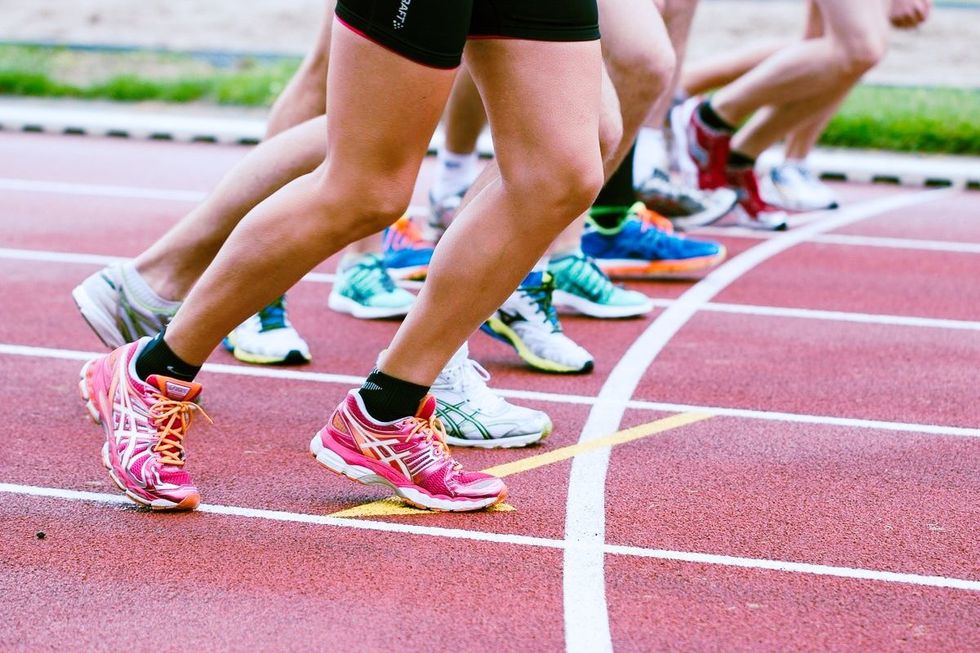We're finally at the point in our culture that we're beginning to recognize the rights of transgender men and women. Unfortunately, that journey is still a work in progress and many people are still resisting the inclusion of transgender people into their identified gender group. While this has been a hot-button issue in recent years in all kinds of contexts, sports has been one of the biggest points of contention.
Many people argue that transgender women should not be allowed to compete in women's sports, citing biological differences in athletic performance. While the argument could technically go the opposite way, most of the complaints have had to do with transgender women competing with other women, not transgender men competing with men.
This fight has been going on for years, but it's worth revisiting as transgender rights are being threatened across the country. Now's the time to help student-athletes who are caught in the middle of the controversy and help them achieve their goals.
History of Transgender Athletes
Sexism has always been an issue in sporting events, with women's sports often dismissed, ignored, or given fewer resources. Although the recognition of transgender people competing in sports is a relatively recent development, transgender and intersex people have been competing in sporting events throughout history.
One of the first athletes to publicly transition was Mary Louise Edith Weston, who was an award-winning shot-put and javelin competitor in the 1920s and 1930s. Weston, who was assigned female at birth and raised as a girl, underwent a series of surgeries in the mid-1930s and transitioned to male, becoming Mark Weston.
Many other intersex and transgender athletes excelled in sports, but most did not discuss their gender identity until after their years in competition. Until fairly recently, these cases were not considered much of a problem and athletes simply competed as normal.
In the 1960s, the first "gender tests" began to emerge, which were humiliating, exploitative, and often, inaccurate. In the 1970s, 1980s, and beyond, many intersex and transgender women were shamed and excluded from top sporting events or had to fight within the courts in order to compete. Even women who did not transition until after they had retired were sometimes called into question or had their awards revoked.
Since then, the controversy of transgender and intersex athletes has grown and shifted into where we are today—with many questioning if transgender athletes should be allowed to compete. Not only are these arguments sexist and discriminatory, but they can cause real harm to athletes' mental health.
The Rise of Transgender Athlete's Inclusion in College Sports
Although the debate of how and when transgender athletes should be allowed to compete is ongoing, more and more college sports' teams are evolving and becoming more inclusive. Some have their own stipulations about which teams a transgender student may play on, but schools are beginning to recognize the need for diversity and inclusion in the historically segregated world of college sports.
It's important for transgender students to be given gender equity and to be recognized as belonging to their identified gender. Being forced to use a locker room that does not match their gender identity or facing harassment can cause transgender athletes emotional distress and trauma or even cause them to quit sports altogether. Fortunately, more and more resources for coaches and administrators are available to help ensure that student-athletes are given every opportunity to succeed.
Currently, States Are Debating Over Transgender Student-Athletes
It's an uphill battle in some states for transgender student-athletes who just want to be included in team sports. In Idaho, legislation has been proposed that would limit or prevent transgender student-athletes from competing in women's sports. Republican lawmakers in other states, like Georgia, have introduced similar bills.
Across the nation, debates on hormone levels and other biological differences continue, without much progress or consensus—partially because most of the opinions are based on speculation and sexist ideas of male vs. female athletic performance. In the meantime, transgender student-athletes are often mocked, harassed, or humiliated when they compete in sporting events. The scrutiny can be very damaging, affecting an athlete's well-being, self-esteem, and present additional challenges that students must contend with.
Is there Anything Universities Can Do To Help?
The hostility and fierce debate over transgender student-athletes take a toll, even in schools that are doing their best to be inclusive. Many students develop anxiety or depression and may decide to drop out of athletics altogether. So what can universities do to protect transgender student-athletes as the controversy continues?
Aside from ensuring inclusivity on the field or court through policy, training, and culture, schools should understand the mental health implications of being a transgender athlete. Offering counseling and mental health support can go a long way toward making transgender athletes feel heard and understood.
Change is slow, but that doesn't mean schools are helpless when it comes to supporting students. Transgender students deserve a place on the field, and they need all the support they can get to overcome the challenges involved in taking that place.





 Going to the cinema alone is good for your mental health, says science
Going to the cinema alone is good for your mental health, says science












 women in street dancing
Photo by
women in street dancing
Photo by  man and woman standing in front of louver door
Photo by
man and woman standing in front of louver door
Photo by  man in black t-shirt holding coca cola bottle
Photo by
man in black t-shirt holding coca cola bottle
Photo by  red and white coca cola signage
Photo by
red and white coca cola signage
Photo by  man holding luggage photo
Photo by
man holding luggage photo
Photo by  topless boy in blue denim jeans riding red bicycle during daytime
Photo by
topless boy in blue denim jeans riding red bicycle during daytime
Photo by  trust spelled with wooden letter blocks on a table
Photo by
trust spelled with wooden letter blocks on a table
Photo by  Everyone is Welcome signage
Photo by
Everyone is Welcome signage
Photo by  man with cap and background with red and pink wall l
Photo by
man with cap and background with red and pink wall l
Photo by  difficult roads lead to beautiful destinations desk decor
Photo by
difficult roads lead to beautiful destinations desk decor
Photo by  photography of woman pointing her finger near an man
Photo by
photography of woman pointing her finger near an man
Photo by  closeup photography of woman smiling
Photo by
closeup photography of woman smiling
Photo by  a man doing a trick on a skateboard
Photo by
a man doing a trick on a skateboard
Photo by  two men
two men  running man on bridge
Photo by
running man on bridge
Photo by  orange white and black bag
Photo by
orange white and black bag
Photo by  girl sitting on gray rocks
Photo by
girl sitting on gray rocks
Photo by  assorted-color painted wall with painting materials
Photo by
assorted-color painted wall with painting materials
Photo by  three women sitting on brown wooden bench
Photo by
three women sitting on brown wooden bench
Photo by 
 Photo by
Photo by  Photo by
Photo by  Photo by
Photo by  Photo by
Photo by 


 people sitting on chair in front of computer
people sitting on chair in front of computer











